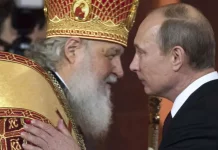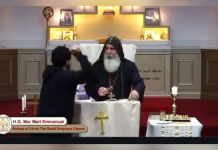Scribes who have been covering the Anglican Communion wars since, oh, the late 1970s or so (there are a few of us Jurassic journalists left) know that this has been a long, complicated road.
In most recent elite-press coverage, this timeline has been radically truncated, turning battles over a wide range of doctrines and church-history issues into a simple good vs. evil clash over LGBTQ rights. In this version of history, this global doctrinal war began in 2003 with the consecration of a non-celibate gay bishop in the tiny, shrinking Diocese of New Hampshire here in America.
Here at GetReligion, I have long referred to this fallacy as “Anglican timeline disease.” Hold that thought, because we will come back to it.
The key, right now, is that journalists need to radically update this timeline, in the wake of some major global developments that are receiving little elite coverage. Here is the dramatic double-decker headline for the major report in The Wall Street Journal:
Conservative Anglican Leaders Call for Break With Church of England Over Same-Sex Blessings
Archbishops from Africa and elsewhere repudiate the Archbishop of Canterbury’s historic role as spiritual leader of Anglicans worldwide
The overture for this solid story included several bites of information that are worth noting:
Conservative Anglican archbishops on Monday said the Church of England had forfeited its traditional leadership role in the worldwide Anglican Communion by approving the blessing of same-sex relationships earlier this month, opening a historic rift in one of the world’s biggest Christian denominations.
“The Church of England has chosen to break communion with those provinces who remain faithful to the historic biblical faith,” the archbishops wrote, adding that their fidelity to traditional teaching makes it impossible for them to remain connected to it or to other Anglican churches that have adopted liberal teaching on homosexuality. “This breaks our hearts and we pray for the revisionist provinces to return” to tradition.
Note that the archbishops claim that they are trying to defend “the historic biblical faith.” Rest assured that, for these Anglican leaders, there is much more to that statement that rejecting decisions by liberal churches to bless, one way or another, same-sex acts and relationships.
It was important, I think, that the WSJ included that quote at the top of the story. Now we need some journalists from elite newsrooms to ask these archbishops questions about the other issues that provoked them into taking this step. In terms of doctrine, there is more to this than a rejection of the Sexual Revolution (click here for some clues). Let’s continue reading that WSJ report:
The statement said the archbishops were “no longer able to recognize the present Archbishop of Canterbury, the Rt Hon & Most Revd Justin Welby, as the ‘first among equals’” among Anglican bishops worldwide.
The outspoken denunciation of the Church of England by 12 leading Anglican archbishops from around the world marks a watershed in a long-running crisis of unity in the Anglican Communion over teaching and practice on homosexuality.
Over the past three decades, Anglicans in Africa and other parts of the global South have become increasingly critical of the socially progressive tendency of churches in the West, clashing particularly on LGBT rights.
The “three decades” reference is accurate and it was accurate to put the word “particularly” in that phrase “clashing particularly on LGBT rights.”
Now, there is one other hard-news fact that news consumers need to consider when reading elite-press reports on this development (I assume there will be more). Who are these conservative Global South bishops and how important are their churches?
Journalists may also want to ask questions about issues of race and ugly colonialism in these clashes. As one Anglican observer noted, when it comes to clashes between the Global South and the rich, but shrinking, churches of the West, “In Anglicanism, every bishop is equal — but some are much more equal than others.”
The WSJ report noted:
Conservative Anglican churches, including some in Africa that represent nearly half of the world’s estimated 100 million Anglicans, have already broken off relations with churches that espouse liberal teaching and practice on homosexuality, including the Episcopal Church in the U.S.
But a break with the Church of England, the historical progenitor of Anglican churches around the world, could threaten the very survival of the Anglican Communion, a loose federation whose bishops recognize the Archbishop of Canterbury in England as their spiritual leader.
The full impact of Monday’s statement will depend on how many of the 42 national Anglican churches sign on. Absent among the signatories was Archbishop Henry Chukwudum Ndukuba of the Church of Nigeria, the largest member church in the Anglican Communion with 25 million adherents in 2020, according to the World Christian Database.
Here is how the BBC handled some of the key issues in this development, starting with the overture:
A group of Anglican leaders from around the world have rejected the Archbishop of Canterbury, Justin Welby, as their leader after the Church of England backed prayers of blessing for same-sex couples.
Archbishops representing 10 of the 42 provinces in the Anglican Communion have signed a statement saying they no longer consider Mr Welby “leader of the global communion”. They added the Church of England was “disqualified” as their historic “Mother Church”.
It’s accurate, but way too narrow, to say that this action came “after the Church of England backed prayers of blessing for same-sex couples.” As I said earlier, there are many other issues involved in this drama.
What is the size of this revolt? The BBC later added:
It is the first time that the Archbishop of Canterbury’s leadership has been rejected by such a large group of churches. …
They make up part of the membership of a group called the Global South Fellowship of Anglican Churches (GSFA), which claims to represent 75% of Anglicans around world, particularly across Asia and Africa.
As always, church-membership claims are a contentious subject. But in this case, the raw numbers cited by independent researchers do push the Anglican Global South (that’s more than Africa) clout into the 75% range.
That’s a big story. You can watch Religion News Service editors tiptoe around those controversial numbers in this recent report: “ ‘We cannot walk with you unless you repent,’ African archbishops tell Church of England.”
The key, of course, is that the national Anglican churches in the Global South are growing, while those on the other side of these doctrinal debates are inching toward demographic disasters, with probable extinction a few decades ahead. See this “On Religion” column: “Anglicans in Canada are facing a kind of ecclesiastical near-death experience.”
While the Global South vote is certainly a strong news hook, the Rev. George Conger — a conservative Episcopal priest and former GetReligion scribe — has noted some very important recent language from Welby that is certainly worthy of inclusion in Anglican timeline updates.
The headline at Anglican Ink: “Welby proposes pulling Canterbury out of Anglican instruments of communion.” Here’s part of that report:
Read it all in GetReligion










